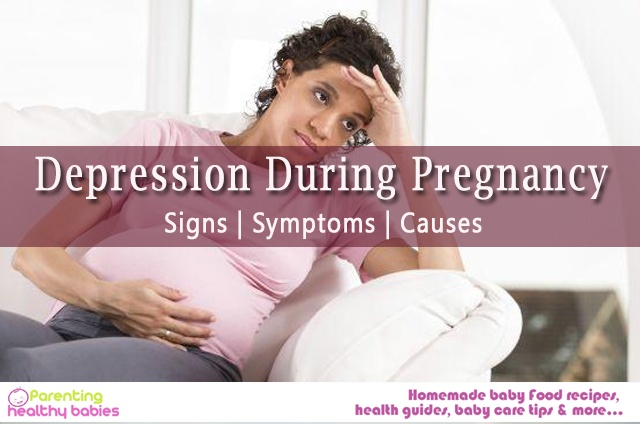Pregnancy is a tumultuous time for a mother with hormones raging and creating a mix of emotions. Generally, a pregnant woman is expected to reamin happy throughout the course of her pregnancy. But sadly, this is not always the case.
What is depression during pregnancy?
Depression is a mood disorder causing a person to feel anxious or sad for a prolonged period of time. Often a pregnant mother feels a sense of depression or sadness during the course of her pregnancy. Depression of this type is also called prenatal or perinatal depression that appears during pregnancy and may continue after the birth of the baby too. A depressed mother may develop post partum depression as well, if the depression continues after her baby is born.
Read More: 11 Foods that Cure Child Depression
Does depression in a mother affect her baby too?
A baby born to a depressed mother may have certain health issues such as low birth weight or premature birth. These babies also show more crying and lower motor scores as compared to babies of non- depressed mothers. Children of depressed mothers are also at risk for developing depression later in life. A depressed mother may not be able to take good care of herself during pregnancy and later of her baby.
Take a look at the signs and symptoms of depression in pregnancy
Read More: Child Depression: 21 Symptoms To Watch Out For
Signs and Symptoms of Depression in Pregnancy
1. Sadness and melancholy
A mother might feel sad, guilty and/or anxious and cry without any specific reason.
2. Loss of interest in day to day activities
Depression during pregnancy makes a mother lose interest in everyday activities she used to enjoy. For example, a depressed, expectant mother may not wish to indulge in her favorite hobbies or lose interest in meeting with people.
Read More: 11 Astonishing Signs of Bipolar Depression in Children
3. Insomnia or excessive sleeping
Depression disturbs the sleep cycle, leading to inability to sleep or a tendency to sleep too much.
4. Fatigue
Tiredness and fatigue accompany depressive symptoms in pregnancy.
5. Trouble with concentration and focus
A depressed mother is unable to focus on her everyday work, making mistakes and unable to retain concentration and memory.
6. Lack of energy
Depression results in loss of enthusiasm and low energy levels in a depressed mother.
7. Irritability
Depression in pregnancy leads to irritable and short tempered behavior in the mother.
8. Helplessness and loss of hope
A depressed mother feels helpless, vulnerable and pessimistic about her situation.
9. Physical problems – headache, muscle cramps and stomach upset
Body pain such as headaches and muscle pain are common in depression. Indigestion may also appear, all without a specific reason.
10. Under or over eating
Depression may be expressed as a loss of appetite and weight or conversely, over eating and weight gain. Both are detrimental to the health of an expectant mother.
11. Suicidal tendency
A depressed mother may have suicidal thoughts or thoughts of harming herself.
What causes depression during pregnancy?
Why do pregnant mothers feel depressed?
1. Hormonal levels
Hormonal fluctuations during pregnancy may give rise to depression in pregnant women.
2. Previous poor experiences
If a mother has faced the trauma of a previous difficult birth, miscarriage or complications during pregnancy, it may result in depression. This is because previous difficult circumstances create anxiety, worry and depression about the current pregnancy too.
3. Money worries
A pregnant woman, who is worried about how she will support her unborn child financially, may get depressed. This is truer for single or separated mothers.
4. Relationship tension
A new baby affects relationships in the family, especially between a husband and wife. A pregnant mother might feel depressed thinking about potential disturbances in relationship with her husband, or other close persons.
5. Family history of depression
If someone in a pregnant woman’s family suffers from depression, there are greater chances of her suffering from depression, too, due to genetic reasons.
6. Stress and lifestyle pressures
A pregnant woman who feels overwhelmed by work and home pressures during the time of pregnancy is prone to depression. Hectic lifestyle and stress ant work may produce depression in a pregnant woman.
7. Lack of social support
Friends and family are primary sources of social support for a woman, especially during the complicated journey of pregnancy. A pregnant woman who feels alone, is more susceptible to depression. For example, if there is marital conflict, divorce, widowhood or if a pregnant woman has a lack of friends to help and support her emotionally.
A pregnant woman must try to enjoy her pregnancy as it involves the wonderful magic of creating another human being. Taking care of one’s own physical and mental health is paramount to having a successful pregnancy and giving birth to a healthy baby. Yoga, meditation and a healthy diet can help in keeping a pregnant woman stress-free and happy.
If depression develops during pregnancy, it can be detrimental to the mental and physical health of a mother and her baby. Recognition of depression during pregnancy is the first step towards getting better. Talking to friends and family, visiting a counselor and leading a stress free, healthy lifestyle can decrease chances of depression becoming a lifelong problem.
A happy mother raises a happy child!
References
https://www.nimh.nih.gov/health/topics/depression/index.shtml
